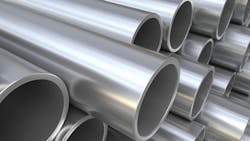China's Crude Steel Output Rises in Teeth of Trade Tensions
China’s crude steel output climbed in May as the world’s biggest producer continues to churn out supply in defiance of complaints that it’s swamping the global market.
Output rose to 70.5 million metric tons, up 1.8% from a year earlier and 1.6% higher than April, the National Bureau of Statistics said on June 13
The figure is just below March’s record 70.65 million tons and brings the total for the first five months to 330 million tons, down 1.4% on year.
China accounts for about half of global supply for the metal used in everything from cars to skyscrapers.
Steel prices in China flipped from bull to bear market in May following a 29% slump in the Shanghai benchmark for reinforcement bar from its April high. The collapse came after regulators and exchanges stepped in to cool excessive speculation and supply expanded as mills fired up capacity to capture thicker margins.
“Many mills have brought back idled capacity or simply expanded existing production to take advantage of good profits in previous months,” said Xu Xiangchun, chief analyst at Mysteel Research in Beijing. Those steelmakers aren’t able to immediately dial back production, according to Lv Xiaohua, analyst at BOCI Futures Co., and “output will remain at elevated levels for some time as long as mills have positive cash flow,” she said.
Trade Barriers
China’s fading infrastructure boom has left it saddled with too much capacity after decades of rapid growth. While production last year shrank for the first time since 1981 as demand contracted, supply still far outstrips domestic needs. The nation is exporting its surplus at record rates, drawing the ire of international rivals.
Competitors from India to the European Union have raised trade barriers and in recent weeks China’s industrial overcapacity has been singled out as a global problem and provoked criticism from Japan’s Prime Minister Shinzo Abe and U.S. Treasury Secretary Jacob J. Lew.
Premier Li Keqiang said conflict over China’s steel production has been blown out of proportion, after meeting with German Chancellor Angela Merkel in Beijing on Monday, adding that the nation doesn’t want a trade war.
Capacity Cuts
China has pledged to reduce capacity by as much as 150 million tons through 2020. Cutting capacity to moderate production remains a long-term effort, said Sheng Laiyun, a spokesman for the statistics bureau, at a briefing after the data was released.
Aluminum production in China rose to 2.68 million tons last month from 2.57 million tons in April, and 2.67 million tons a year ago, according to the data. Output declined 1.7% in the first five months to 12.62 million tons.
Chinese smelters, which had pledged to slash production to bolster prices, are bringing back idled capacity after prices rebounded this year. With most producers in the world’s largest supplier enjoying solid margins, output growth will accelerate to 4% year-on-year in the second half, Goldman Sachs Group Inc. said in a report earlier this month.
About the Author
Bloomberg
Licensed content from Bloomberg, copyright 2016.
